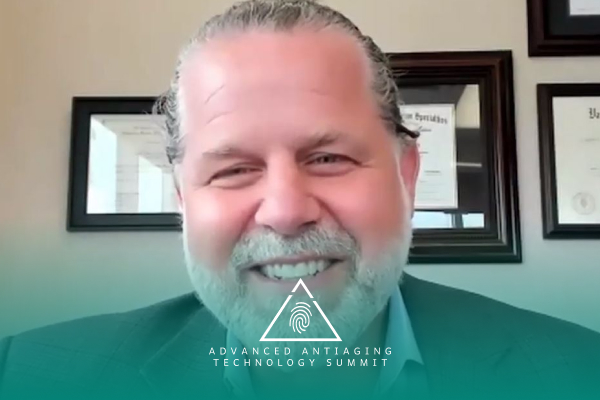Join the discussion below

Dr. Goel is a medical physician and founder of Peak Human Labs. His mission is to speak knowledge of the latest cutting edge medical tools and science in order more people to live in a Peak mental, physical and spiritual state. You can learn more about his work at longevity.peakhuman.ca. Read More

Dr. Ryan P. Lowery is the CEO of Ketogenic.com and President of the Applied Science and Performance Institute. He has published over 150 papers, abstracts, and book chapters on human performance and sports nutrition and is heavily focused on the impact of ketogenic diets. Ryan has received the Exercise Science... Read More
Sanjeev Goel M.D., FCFP (PC) CAFCI
Hi everyone. I’m Dr. Sanjeev Goel and you’re listening to the Advanced Antiaging and Technology Summit and today I have Dr. Ryan Lowery with me. I’m so excited that you’re here. So we’re gonna be talking about, “Ketogenic Lifestyle and the Impact on Aging.” So yeah, let me before I do that I want to just talk give the bio, so let me just let me go through that first. So Dr. Ryan Lowery is the CEO of Ketogenic.com and president of the Applied Science and Performance Institute in Tampa Bay. He has published over 150 papers, abstracts and book chapters on human performance and sports nutrition and it’s heavily focused on impact of ketogenic diets. I was just reading of the “Ketogenic Bible.” I was just going over that just this morning. It’s pretty awesome. Ryan has received Exercise Science Scholar of the Year Award, NSCA Award for Outstanding Presentation of the year award and national AAHPERD Exercise Science Major of the Year Award. Ryan Co-authored the book “Ketogenic Bible” alongside his partner Dr. Jacob Wilson, which focuses on the science and practical application behind the ketogenic diet, exogenous ketones, and all of their potential applications. So, welcome again, thank you so much. So maybe let’s just.
Ryan Lowery Ph.D
Thank you.
Sanjeev Goel M.D., FCFP (PC) CAFCI
I know I don’t want to spend too long on this but I think people should understand how you got into this field and like why, I know you have a bit of a personal story on that. So maybe just give us a little, the viewers a little bit about that. That’d be great.
Ryan Lowery Ph.D
Yeah, for sure. First off thank you, it’s an honor to be here. I’m super excited to be joining the summit. Yeah for me, and like many of you who are watching this we all have our own story for me, that was my grandmother. She passed away way too young. She was type 2 diabetic, have heart disease and was obese. And she passed away when she was just 61 years old and being a big Italian family, your grandmother is like the rock of it, right? So that took a big toll on my entire family. And so I made it my mission is set out and I said no, I don’t want other members of my family and I don’t want other people to have to go through that same tragedy or the same challenge that we went through.
And so I thought about it and I said, you know what? Exercise is great. I love exercise, it’s super important but like as much as I wanna convince my mom to go resistance train, sometimes she’s just gonna be like, sweetheart, I’m not doing it. But we all eat, right? So I was like you know what, let me focus on nutrition. And so that’s where I went to University of Tampa, I met Dr. Jacob Wilson. And we started studying nutrition and over 10 years ago I had no idea what keto or ketosis was. And then I started hearing about it you have to eat sardines and stuff. And I was like this sounds not true, this sounds awful.
First forward after I was done playing baseball after I got done with my masters I was like you know what, let me try this. Let me try this keto thing and really figure it out. And from there I was hooked. I’ve messed up a lot in the beginning. I made a lot of mistakes ’cause there wasn’t as many resources as there are today. And then kind of figured it out over the last decade, ended up dedicating my entire PhD to it and studying some of these alternative applications beyond just what people think weight loss with keto and continue today to just study it and be super interested in the topic.
Sanjeev Goel M.D., FCFP (PC) CAFCI
Wow, okay that’s awesome. I have a bunch of little questions that I’m particularly interested but maybe just for the viewers just like a couple of minutes about what is ketogenic diet and how it works and that would be really awesome yeah.
Ryan Lowery Ph.D
Yeah, so you typically hear oh a ketogenic diet is this ratio of fat, this ratio of protein and this ratio of carbs. In simplest terms, it is a lower carb, moderate protein, moderate to high fat diets, right? The way we describe it in the book is any form of eating in which your body switches from primarily running on glucose and carbohydrates, to fat and ketones as its main source of fuel. There’s a million ways to do keto, a million ways but generally it’s like I said, lower carb, moderate protein, moderate to high fat diet. And most people what we’ve seen is a lot of people think, oh I’m gonna do a ketogenic diet for weight loss. And they end up staying for a lot of the other benefits that ketosis can provide when your body is now running primarily on you’re still utilizing glucose to a little bit of a degree or primarily running on fat and ketones as its main source of fuel. And there’s a whole host of benefits that I’m sure we’ll talk about.
Sanjeev Goel M.D., FCFP (PC) CAFCI
Yeah, We’re gonna get into some of that for sure. So maybe I would like to hear like to talk a little bit about the impact on inflammation, ’cause this is about aging. So maybe just tell us a little bit what are your thoughts about how a ketogenic lifestyle would impact aging? And what’s the research saying so far about that?
Ryan Lowery Ph.D
For sure, and there’s not much human data, right? We wouldn’t be around to see it but there is some interesting animal studies where they’ve and we’ve actually done one and I’ll talk about that, but before we started doing research on it they were actually doing studies in C. elegans where they were literally taking the C. elegans and bathing them in ketones and seeing that they actually extended lifespan when they were in this constant state of ketosis.
No other variables changed. And so that was like, what’s going on here? And I’ll talk about the mechanisms by which you mentioned one of them, the anti-inflammatory aspects. There’s also other signaling capabilities that ketones have. But we set out to do the same and we said you know what, let’s do this study where we basically took animals. We fed them a Western diet, we fed them like a standard calorically restricted diet, and then we fed them a ketogenic diet. And we started feeding them at what would be the human equivalent of say 25 years old. And we just let them eat that way the rest of their lives. So we carried it out until the animals basically died.
Sanjeev Goel M.D., FCFP (PC) CAFCI
This is C. elegans, right? What exactly, what animal is this?
Ryan Lowery Ph.D
This was in mice.
Sanjeev Goel M.D., FCFP (PC) CAFCI
Oh mice, okay good, yeah okay
Ryan Lowery Ph.D
Yep.
Sanjeev Goel M.D., FCFP (PC) CAFCI
Mice, okay.
Ryan Lowery Ph.D
So this was in mice. So we carried it out until they died, dissected them looked at all the organs stuff and there’s, it was crazy. And this was one of the biggest game changers for me is like after they were after all of them died, you cut them open and like the ones that were on a ketogenic diet literally looked like something out of a textbook, very little visceral fat around the organs, is still look clean. And this is like, these were old. They were like human equivalent of like a hundred year old mice. Whereas the standard diets still had a little bit of fat ’cause but they didn’t have much because they were calorically restricted their entire lives but like the western diet that was eating a ton of calories.
It was a ton of visceral fat, tons of inflammation et cetera. So as you can imagine, the ketogenic dieting group lived longer. And on average, they lived longer than I think it was like 27% longer than the Western diet or the standard diet. And there was just a lot of interesting things that we took away from that. One of which is the one of the primary mechanisms by which we think ketones and being in ketosis or a ketogenic diet can help with aging, is ketones act as something known as histone DSE to release inhibitors. So the easiest way I explain histones and histone DSE list ’cause it’s a challenging word to even get out. It’s like imagine cells inside of our bodies have like light switches and our genes have these light switches. As we get older, a lot of these light switches start turning off, right? And these histones come and-
Sanjeev Goel M.D., FCFP (PC) CAFCI
Just from age, right? That that’s a normal kind of aging process that these histones are like coming on top of the DNA is that what’s happening like there kind of blanketing?
Ryan Lowery Ph.D
Exactly. Normal aging, it can be accelerated by a variety of things, right? Your environment, smoking, lack of exercise, poor nutrition, all these things accelerate how quickly the lights turn off but normal aging, as we get older a lot of those start to turn off. Ketones act as these HDAC inhibitors, where they basically stand, I say like imagine a body guard standing right next to the light switch and being like, nope you’re not turning this off right now. And it keeps a light switch on and that’s what we’re seeing. And there’s a lot more data coming out about ketosis in particular having these like longevity affects acting through this HDAC mechanism.
Sanjeev Goel M.D., FCFP (PC) CAFCI
That’s so interesting. Let’s say if the lights which has already turned off, can it turn it on, that we don’t know?
Ryan Lowery Ph.D
That’s a great question. I don’t know if we know that. I don’t know if it’s been shown to, if they can turn certain ones on or certain ones off. That would be really interesting to look at that.
Sanjeev Goel M.D., FCFP (PC) CAFCI
Right, so I guess that’s, so it’s really on the DNA level that we think that this ketosis is having an impact. And so maybe we’re just jumping ahead. So something like exogenous ketones, do we think that the benefit is that happening at that level because it’s just the ketone molecule? or body that’s-
Ryan Lowery Ph.D
It could, there’s a lot to unwrap with exogenous ketones. ‘Cause there’s a lot of junk and stuff that’s being claimed that isn’t really necessarily true. But if you give the proper form of ketones, you give the right dosage, the right form because I don’t know if you want to dive into this but like with ketones.There’s chirality. So one of the best ways I explain this is if you’ve ever heard of the amino acid leucine, right I’m sure everyone here has heard of leucine. When you supplement with leucine, we utilize L-Leucine. It’s L-Leucine, there is a D-leucine but no one utilize it. It’s not bioavailable, It doesn’t get taken up by our bodies and utilized. And in some cases, when it comes to like certain drugs you’re using the different enantiomers some actually could have adverse effects, which is why you use the other anantomer.
When it comes to ketones it’s the same thing. There’s a D form and there’s an L form. A lot of the ketones that are out on the market that ones that even that are being utilized in research are a mixture of 50% D 50% L. Well, what our bodies naturally produce and make is D, very little L is produced inside of our bodies. So D is the anantemor or the isomer that we should be utilizing and studying and research. And when you see the ketone ester research most of them use primarily D but when you see ketone salt research a lot of them use 50 50. So that’s why there’s so much uncertainty or unknowns when it comes to exogenous ketones because there’s still a lot of confusion on the market.
But to answer your question I mean, if you’re using the right form, you’re using the right amount we’ve studied different varying dosages in our lab. We actually just completed a 90 day toxicology study with varying levels of exogenous ketones. You can have benefits. And a lot of those benefits that we’re seeing in our laboratory are on the brain. Not necessarily like I’m gonna drink ketones and instantly gonna melt fat off of my body. It’s more like we’re seeing benefits for like neurological applications. Better focus, better quality, increased reaction time and some of these different areas.
Sanjeev Goel M.D., FCFP (PC) CAFCI
Wow, let’s just rewind that a little bit. So the, if we want the D isomer of a beta hydroxybutyrate, I assume is that correct?
Ryan Lowery Ph.D
Yep.
Sanjeev Goel M.D., FCFP (PC) CAFCI
And so I know are you allowed to tell us like where we should be going? Like I mean, it’s there’s many companies out there. I myself, the drinking Pruvit ketone broth but maybe if you could just kind of and I’ve seen the esters, like there’s some out there these companies hard to find. Like tell me what you would recommend to the listeners, where should they be going?
Ryan Lowery Ph.D
Yeah, Pruvit it’s the only company that really uses that a hundred percent D. All the other ones will use a mixture of the two. And when it comes to ketone esters I wish this wasn’t the case but when it comes to ketone esters, they’re super expensive. Like you said, they’re pretty hard to find and the taste is just brutal. Like it’s gotten better over the years. I tried an original ketone ester the ones that were being studied in like the 2000s early 2000s and that thing tasted like my great grandfather’s great-grandfather’s gin. Now it just tastes like my grandfather’s gin. So that’s a little a perspective for you.
Sanjeev Goel M.D., FCFP (PC) CAFCI
Right, okay. What about impact on like cancer, if you want to just I know you have a whole chapter in your book about that and can you just tell us what is the research showing us right now?
Ryan Lowery Ph.D
Yeah, and there’s been a lot more recently especially with brain cancer and breast cancer. There’s been some a lot of work done. But yeah, I mean one of our colleagues, Dr. Thomas Seyfried has been doing a lot talking about the metabolic therapy of ketosis for targeting cancer. And in general what we know is this, cancer cells due to their dysfunctional metabolism, thrive off of glucose. And so the question is not that a ketogenic diet should be the be all end all but why not use it as an adjunct to standard of care? And what we see even with just fasting or keto, but there are studies specifically with fasting that if they take patients and they fast them for a prolonged period of time before some of these like chemo or radiation, the dosage that’s needed is a lot less to get the same effect. The cells in our bodies become more sensitized to it possibly through lowering glucose, you’re giving less food or less energy for the cancer cells to metastasize and keep going and growing. So, theoretically there’s a lot of promise there but definitely some more work to be done.
Sanjeev Goel M.D., FCFP (PC) CAFCI
Okay, I get this question a lot and I have this as well this, people can eat a low carb diet. Let’s say maybe it’s a 100 grams or 50 grams of or maybe a 100 grams of carbs a day and so is the, what’s the difference that they’re not are they not getting the benefits? Well, how much benefit they’re getting? If somebody is very active and burning a lot of carbs, are they gonna be okay with they’re gonna have some ketosis anyways?
Ryan Lowery Ph.D
Yeah, it’s super individualized. So if someone I know people who have eaten a 100 to 150 grams of carbs a day and been in steady ketosis, but they’re like usually have a lot of muscle mass, super active. For your general person who might be not as active, sits around a lot or works like a more of a sedentary job, they probably wouldn’t be able to get away with that. Now I say this, it’s I always say don’t miss good up for perfect. So if you’re going to go if you’re going to eat 150 grams of carbs and like that’s a you were eating 400 grams before, that’s great. That is a huge win. Like I tell people the goal is to get people to become more carb conscious. I don’t even tell everyone they need to be eating keto, right.
Even though I’ve been eating it and we educate on it I don’t think every human being on the face of the planet needs to be keto. I think we all can take strives to become more carb conscious and stop eating a lot of these refined processed carbohydrates that are just junk on the market. But are there additive benefits to actually being in this state of ketosis? Yes, if someone is kind of sitting on that fence where you’re low carb, but you’re not fully into ketosis, you might be like having some brain fog. You might be like oh, this is brutal. And a lot of it’s because you kind of haven’t gotten over the fence on it where you’re really able to tap into your fat stores, really able to ramp up lipolysis to produce ketones at a high enough level that you’re full or you’re not as hungry all the time which these are common benefits that we see in individuals who are in ketosis.
Sanjeev Goel M.D., FCFP (PC) CAFCI
That’s very interesting because yeah, I’ve had that issue where yeah, this is very difficult. At least at the beginning we call it the keto flu, I guess. But you’re saying that if you just stay in there if you’re just staying like around that hump you don’t necessarily get over these symptoms. What you’re saying, you kind of you stick around.
Ryan Lowery Ph.D
Yes, it becomes difficult to, I like to use it. I say the analogy of like sitting on the fence like it’s not very comfortable when you’re straddled sitting on a fence. It’s like what your body isn’t getting a ton of glucose and carbohydrates from your diet yet you’re not fully keto adapted. So you’re kind of waning back and forth between the two where like you might be tapping into glycogen stores but then you’re like oh, I need to tap into lipolysis and it’s like, ah it’s not really happening to the degree that you would. So I would say it’s a better step to ease in but either that would be the next step would be like kind of get over that fence and go all in.
Sanjeev Goel M.D., FCFP (PC) CAFCI
I was just listening to Peter Attia on his podcast and he had a whole thing on bad flux just recently he was talking, he was saying that that this lipolysis is the amount of lipolysis we have is a function of insulin resistance and things like that. So can you tell me how is the keto adaption what exactly is happening physiologically and how does it make it, does it make it easier for this lipolysis to occur in the cells?
Ryan Lowery Ph.D
Yeah, so keto adaptations it’s a very interesting process. There are ways to speed it up that we’ve kind of studied in our lab, but really what’s going on is imagine all of us have a finite amount of glycogen which is our stored form of carbohydrates that we can store, right? We have seminar liver and seminar muscle tissue that we can tap into. Well, as we go about our day especially as we tap we start doing exercise, we start to pleading that glycogen. Well, as we kind of keto adapt, you’re not consuming as many carbohydrates. So you’re depleting that glycogen and there’s not very much being replenished early on. There’s some studies showing that our bodies are very smart and the longer we’ve been in ketosis we can actually still replenish our glycogen which is a whole nother animal.
But we started depleting glycogen during keto adaptation and so our body starts ramping up because like you said, insulin’s low, we’re ramping up this process known as lipolysis to increase ketones, start tapping into our own body fat, burning that body fat at a rapid rate in which we’re increasing ketones to now provide the main source of fuel. And there’s ways you can accelerate that. Periods of intermittent fasting can accelerate that. One of the things that we saw in our laboratory is high intensity interval training. So doing like all out sprints on like we used a Wingate bike, but even just a spin bike or even just doing running sprints, high intensity interval training can speed that process up because that form of cardio depletes muscle glycogen levels very quickly. So the quicker you’re able to deplete those and get over that hump, the less likely you will be to experience those negative symptoms that people talk about with keto flu.
Sanjeev Goel M.D., FCFP (PC) CAFCI
So the negative symptoms are coming from what? Sorry, just explain to me. So then yeah, so the glycogen gets depleted easily with the HIV, the hit, but how does that help with the removing the negative symptoms?
Ryan Lowery Ph.D
So there’s two common things that are responsible for keto flu. The one that the high intensity interval training will help is it gets you over the fence. Kind of like that analogy.I was using before is like rather than straddling it where like your glycogen hasn’t been depleted enough and fat burning hasn’t been ramped up enough, you’re still sitting there you’re depleting glycogen very fast. So it’s kind of like a little kick over the fence to go like hey, let’s go more towards fat-burning. That’s the one thing is you need to ramp up this ability to burn fat quickly and be able to get ketones high enough to be able to provide a fuel for your body.
And then the second thing that often happens with the keto flu, is electrolyte imbalances. So whenever you lower insulin, whenever you’re eating a lower amount of carbohydrates and you lower insulin things change inside of our bodies. And one of the things that changes is how we excrete out or how we handle electrolytes. So we start excreting out things like sodium, calcium and potassium at a much higher rate. And so what often got demonized in our society like sodium it wasn’t the sodium that was the issue.
It was the large fry that had a ton of sodium in it because what happens when you eat that large fry is you’re getting a huge glucose response, huge insulin response and on top of that here you have a huge sodium load and your body’s not excruciating it, it’s doing the opposite. It’s storing it and holding onto that where ketosis changes that, your insulin is low. You’re screaming this out very rapidly which is why we recommend like salting all your foods, making sure you’re getting in these electrolytes like potassium, eat like half an avocado a day. That’s a great source of potassium. Spinach to get some magnesium in, or even just supplement with a good quality electrolyte supplement like to help boost them. And those are some things to help get over that process.
Sanjeev Goel M.D., FCFP (PC) CAFCI
Okay, now that makes sense. Okay, so what about like a vegan ketogenic? What about vegans? What can they do and how can they still do a ketogenic diet?
Ryan Lowery Ph.D
Yeah, it’s tough. It’s a lot tougher to do vegan keto. It’s possible. One of my good friends, Dr. Will Cole wrote a book called “Ketotarian.” It was more of a vegetarian approach to keto but to kind of go over into full vegan. The thing I would say is like avocados are gonna be a huge staple. Things like tofu in moderate amounts, but again, it’s the thing you need to focus on is getting in good quality sources of protein. So, and that’s often with a vegan based diet that is a little bit of a challenge. And so you might need to supplement in especially if you’re trying to do vegan keto you might need to supplement with some of these important amino acids things like the branch chain amino acids, leucine, use vegan based sources to supplement those in to make sure you’re hitting that protein threshold. To make sure that you’re not only holding on or holding onto muscle, but hopefully gaining it as well.
Sanjeev Goel M.D., FCFP (PC) CAFCI
Right, okay. What can one do to let’s say, you mentioned fasting so intermittent fasting and so on. How is this being used in conjunction with a ketogenic lifestyle? Like what do you recommend because they’re kind of working a some ways similarly. So what do you think is what do you do for yourself or what do you recommend others, others doing fasting in their life?
Ryan Lowery Ph.D
Yeah, So I like to say I tell people that meet them where they’re at. Like if someone’s coming off of a standard American diet and eating eight meals a day, I don’t think the best approach is to try and get them to fast for two days, right. Like that’s gonna be very difficult for them to do as like a water only fast for two days is really hard when you’re used to eating 16 meals in that time period. So I say like, listen if someone’s just eating three meals a day every single week, maybe twice a week ask them to bump out the breakfast and just say, hey instead of having a breakfast let’s just see if we can get through to lunch.
Because for some people a 14 hour fast as a long time, like a long period of time and a lot of it’s mental sure. Where we’ve been programmed and to kind of say you know what, we need to eat every two hours. And we have foods that are hyper palatable that make us go oh my gosh, I’m hungry again. I’m hungry again. Or at least think we’re hungry. So it becomes challenging. Personally where I’m at right now, I do a 24 hour fast once a week. So I do what I call metabolic Mondays.
I eat dinner on Sunday night and I don’t eat again until Monday night. It’s a, it’s an easy process for me because Mondays are usually a busy day for me. So I just eat and then I’m like, oh it’s already like five or six o’clock at night on Monday. I just eat dinner. Typically during the week I intermittent fast. I don’t even count me hours ’cause I don’t think you need to be like, oh, 18 hours and one minute. I don’t think it needs to be that rigid. I tend to eat two meals a day, Tuesday, Wednesday, Thursday Friday, and then on the weekends I typically have three meals a day. That’s when I might wake up and I might make my keto pancakes or keto waffles or something like that just because I’m a little bit more active. I usually take my dog on a walk or a hike or something like that. But I’m flexible in that regard but that’s kind of a typical protocol for me.
Sanjeev Goel M.D., FCFP (PC) CAFCI
Okay, that makes complete sense. So let’s talk a little bit about exercise to that’s and so as people were athletes or high performance individuals how do they incorporate this the ketogenic lifestyle and you have to have concerns probably about muscle loss and so I’m sure you’ve done a lot of research in this. I read in the book too. Some of the things if you could just kinda tell us what people how to address some of these concerns, that’d be great.
Ryan Lowery Ph.D
Yeah, and if you’re a high level athlete I honestly think it depends on where you’re at in your journey and then also where you’re at in your season. Like, I wouldn’t recommend most high-level athletes try and start keto in the middle of their season, right. Like this is something that you probably need to get adapted to prior to your season. Otherwise you’re gonna go through if you don’t if you aren’t properly coached or working with someone. You’re going to go through that keto flu period and you’re going to be like, I had a terrible game, right. And a terrible run whatever, and you’re gonna blame it on keto, but you just weren’t adapted.
So it takes time for that process to happen. In terms of muscle, it was really one of the first studies we ever did almost wow, it was about almost 10 years ago. About a little over, yeah wow. So we did a study where we said, you know what? There was a lot of research out there that showed that you can gain muscle on a ketogenic diet but the problem was, most studies that looked at this or all studies at this point, they were basically letting the ketogenic group eat ad libitum and they were letting the standard American diet eat ad libitum. And so what a lot of people were saying where the ketogenic group was eating more protein, that’s why they were able to gain just as much muscle like they’re like oh, they were eating more protein.
They were eating more protein. And there was a famous study by Paoli, Antonio Paoli out of Italy with gymnast. And he saw that they were able to gain just as much muscle but they were eating a little bit more protein. So we said, you know what? We want to control for this. So we did a study in resistance trained, a highly resistant trained individuals. We took them, we adapted them for two weeks and then we fed them either a ketogenic diet or a Western diet. And we matched for protein, make sure there was no differences between the proteins, between the groups.
We train them three times a week for eight weeks. At the end of that eight weeks we DEXA, we did a DEXA again. And when we found was both groups were able to gain just as much muscle. There were no differences in muscle mass, but at the end of that, that 10 weeks, the two week adaptation and the eight weeks of training, after that 10 weeks the ketogenic group actually lost more fat. So they were able to gain just as much muscle but they lost more fat mass over that same period which was a really interesting thing. And kind of since then, there’s been a lot more studies that have equated for protein and saw that a ketogenic diet can gain just as much muscle if you allow the proper amount of time to adapt.
Sanjeev Goel M.D., FCFP (PC) CAFCI
Right, so this keto that adaptation sounds like it’s key for somebody. So once somebody gets, let’s say if somebody gets has been working on a low carb diet or just becoming more carb sensitive, is that like, is it a complete on and off switch to become keto adapted or you just gradually a person can become keto adapted and then it’s easier the next time when they like is this, what do you what’s your thoughts on that?
Ryan Lowery Ph.D
Yeah, the longer you are in ketosis, the easier it is to get back into ketosis. So, like I see what happens a lot of time is people will try and keto adapt for the say, they’re just starting keto fresh. And they’ll go two weeks keto and then they’re like, ah screw this. I’m having some of these symptoms. And then they go and have pizza and stuff. And then they’re like, let me try this again. And they’re constantly going through this vicious cycle. Whereas like someone like me, I every month I’ll have sushi. Like it’s like my little date night. So like, we will go have sushi and it’s easy. Like I’m actually back in ketosis regard I still I have the resistant starch for the rice, but like it’s once a month I do it on a day that I’m super active. And so I literally have maybe a roll of sushi the next morning I’m back in ketosis. So I’m able to adapt and clear that very very very rapidly. Whereas someone else that might take them a whole nother week to get back in.
Sanjeev Goel M.D., FCFP (PC) CAFCI
But that’s just like is that like years of like you think your body has become now used to this?
Ryan Lowery Ph.D
I think so. I think we are seeing changes in Dr. Jeff Volek has done some interesting research looking at this with endurance athletes. There are metabolic changes that happen like that might not happen in the first year while you’re on keto, but like some of these runners and that’s kind of going back to the glycogen talk that we were talking about. But these elite runners who are fueled by keto, they’re been on a ketogenic diet for multiple years are able to replenish glycogen to the same extent as people who are eating a high carbohydrate diet after race, despite not eating any carbohydrates their bodies have adapted in such a way that I don’t think you would get that same process in the first six to 12 months. I think that’s something that probably takes years for your body to go, alright now I know how to ramp up this gluconeogenesis from other factors that aren’t muscle tissue or protein that we think, other different markers to help replenish this glycogen.
Sanjeev Goel M.D., FCFP (PC) CAFCI
How are they getting, how are they creating the glycogen from protein? Like how’s that been created if they’re not
Ryan Lowery Ph.D
Yeah so really interesting. We’ve done some work and Jeff’s done some work looking at this. So what we found is that on a ketogenic diet, you your body’s amazing in that ketones helps spare the breakdown of important amino acids. And when I say important ones, I’m talking about like the essential or branch chain amino acids. So it’s not like your body’s going, oh my gosh I need glucose or glycogen. Let me tear down muscle tissue. That that’s really not what’s happening. Instead what we found in the animals was that, alanine like amino acids like alanine, which really doesn’t have much of a purpose other than to serve as a glucogenic substrate gets really depleted on a ketogenic diet, like significantly lower than a Western diet whereas the branch chain amino acids were different. So our body goes, hey, here’s some glucogenic amino acids. Let’s use those to convert over. They can also utilize glycerol and lactic acid, right. So like what Jeff’s lab saw was like, if you looked at the glycerol content inside of these athletes that were keto, it was really low after the race. And there’s a lot of thought that like these this glycerol lactic acid complex, you’re able to create glucose or glycogen from this process as well to help fuel that glycogen.
Sanjeev Goel M.D., FCFP (PC) CAFCI
Like triglycerides basically, right. The glycerol-
Ryan Lowery Ph.D
Exactly.
Sanjeev Goel M.D., FCFP (PC) CAFCI
And the fatty acids breakdown. Right. So maybe it’s just jumping into the type of fats like what do you rec, I mean all fats are not crit equal. And what are your thoughts about what type of fats people should be having? I mean, we sometimes hear about like Atkins diet people eat whatever you want it, like how much ever meat or whatever, the people and then so I think I’m just wondering if you could just clutch set some clarity on that for listeners.
Ryan Lowery Ph.D
Yeah, I think it’s about getting as high quality as you can, right. So I sell this to people all the time like, people will say oh, well, in that case I’m just gonna go to McDonald’s and get a big Mac without the bun. And I’m like well, like, is that okay to do occasionally if you’re in a bind? Sure, I that’s better than going to crispy cream and getting donuts or whatever. Like, that’s fine. But like should you be doing that every day for lunch? Probably not. So like, what we know is saturated fats are often demonized and for all the wrong reasons but I do think you should get a mixture of some of these other important fats, like monounsaturated, polyunsaturated but you need to be careful.
Primarily what I see the most of is the omega-6 fats tend to run rampant like a lot of people will cook with vegetable oils and things like this. And so it throws that omega-6 to omega-3 ratio out of whack. So just make small choices like if you’re cooking with cooking spray don’t get the canola oil, get like an avocado oil spray or a coconut oil spray if you’re not cooking at a certain heat, like just make some of these small changes instead of getting like soybean oil ranch dressing, try making your own ranch dressing or there are sources out there now that are using things like avocado oil as a base. And so that’s where I think when we’re talking about some of these inflammatory fats where people just go, oh, I just I can eat whatever. A lot of it’s just like keep it in context, make small adjustments to make sure that you’re not like blowing it out of the water.
Sanjeev Goel M.D., FCFP (PC) CAFCI
I had some patients come to me they’ve started the I take at least reduce carb but potentially keto diet. And then they come back with the cholesterol has been elevated. So what, what would you tell them? I mean, I know cholesterol is not everything anymore, but what’s your thoughts on that?
Ryan Lowery Ph.D
Yeah, it’s such an interesting topic. I think what we typically look at in terms of total cholesterol and LDL cholesterol, we need to adjust when we’re on a ketogenic diet because I think again, it’s also often got demonized. Cholesterol has gotten demonized from total and LDL cholesterol. One of our colleagues, Dr. David Diamond, he does a really good job breaking this entire cholesterol conundrum down. But the reality is you need to look deeper. You need to kind of take a magnifying glass and look a little bit deeper than just total cholesterol. What I recommend to people when they’re like, oh my gosh my cholesterol is really high. I say go get an NMR LipoProfile test.
It’s gonna give you a deeper understanding of like particle size and all of these other factors. But you also need to take into account other inflammatory markers like look at creatine kinase, look at hemoglobin A1C, look at fasting triglycerides, and then look at the NMR as well. ‘Cause you can’t make a judgment and this is what’s scary about traditional medicine is like they will do a basic cholesterol profile not look at any inflammatory markers, not look at A1C, not looking at fasting triglycerides. See someone’s cholesterol is a little bit elevated and go you need to be on the . And then it’s like, we know there’s plenty of side effects that come along with science. And it’s like that person could have been amazingly healthy like perfectly fine and healthy, but like the markers or the goalposts that we’ve set for cholesterol and it being the be all end all for health, we’ve missed that mark. And I think it’s about time we update them and come to new terms of like, it’s not a just as easy as let’s look at cholesterol and LDL cholesterol as the only viewpoint.
Sanjeev Goel M.D., FCFP (PC) CAFCI
Yeah, now thank you. That’s so well said. So what maybe is just we’re just kind of ending off a couple of things I wanted to ask first is that on your own health, like how would you say this has impacted you? Like you look like you’re in great health. I’m just curious if you could just kind of tell people like what impact it has had for you?
Ryan Lowery Ph.D
Yeah, for me I never and this is interesting ’cause I never approach keto for weight loss. I came into it from more of a researcher like I can’t put our subjects through this if I haven’t done it. And so I did it in the first time I did it I failed miserably because like I said I didn’t know what the proper electrolyte balance was. I was eating, I was just chugging heavy cream and like trying to make everything into a sweet dish ’cause I had such a sweet tooth and I was like I messed it all up. But it took me about six months to figure it out. And I was like, you know what, let me give this another shot.
Now, I stay keto and I will probably be eating keto for the rest of my life in that like I reap all the other benefits. So for me a lot of it’s cognitive focus like clarity having what I call food freedom. That was a big thing for me because I was someone when I was younger and playing sports and all these other things, I could eat whatever I wanted, right. I could eat Chick-fil-A. I could eat McDonald’s, it didn’t matter. I could eat it because I was playing baseball. I was burning through calories like crazy. But the minute that stopped, I was like oh gosh my metabolism changed pretty significantly. And with that, I still have the same hunger that I had prior.
So I was used to eating five or six meals a day. Now, like I just told you before, there are some days where I eat one meal a day. There’s some days where I eat two meals a day. If I was primarily reliant on a carbohydrate based metabolism, that would be almost impossible for me to do. So with the work that we do at our lab, with the education like it’s so freeing to me to go it’s the afternoon and I haven’t even eaten today. Like that’s unheard of before me like I-
Sanjeev Goel M.D., FCFP (PC) CAFCI
The calories remained the same, right? The calories remain the same or no?
Ryan Lowery Ph.D
Yeah, typically my calories-
Sanjeev Goel M.D., FCFP (PC) CAFCI
You just need more calories at one time, is that what happens?
Ryan Lowery Ph.D
Exactly, I eat a larger portion. Like I typically I’m known for eating like a lot of carbs salads. That’s typically my lunch. I like volume ’cause I still, even though my hunger is significantly less on keto, I still have like, you know what I need to eat volume to help increase my fullness and increase satiety. So I like big salads. Sometimes I make shakes and I blend them up. So they’re really big shakes, but they’re not really calorically dense. They’re they’re just blended up with ice and unsweetened almond milk and some protein and MCT. So for me it’s probably the same amount of calories but it’s just brought down to bigger volumes, smaller readings with them.
Sanjeev Goel M.D., FCFP (PC) CAFCI
Interesting, very interesting. Just one last other thing about the, you mentioned about the Alzheimer’s I know you have a I know a lot of our viewers are interested in then it ties directly to aging. So can you just talk a little bit about that like the impact about ketogenic on preventing Alzheimer’s or dementia, that’d be
Ryan Lowery Ph.D
For sure. Yeah, what we see and it’s being referred to as type 3 diabetes now. And what we’re seeing is a lot of insulin resistance being the underlying root issue in a lot of these neurodegenerative diseases. Alzheimer’s, Parkinson’s, traumatic brain injury. The list goes on and on and what’s happening like for example we’re studying right now traumatic brain injury which correlates very similarly with Alzheimer’s. Like if you take some of these professional athletes who have played contact sports and you compare their brain versus an Alzheimer’s patient brain most doctors wouldn’t be able to tell the difference. There’s a lot of similarities with towel plaques and build up and a lot of issues.
But what happens in these brains it happens a little bit slower and prolonged in Alzheimer’s, it happens very rapidly in traumatic brain injury. Is in traumatic brain injury when you get this huge impact you get this hit to the head, your brain becomes temporarily insulin resistant yet what do athletes do? They go over to the sideline, they chunk down sugar, right? They shut down a lot of these sugar-based drinks. Well, their brain is unable to utilize that. It’s what we call starvation in the face of plenty. You have plenty of quote-unquote “fuel” yet your brain is still starving and it’s starving for an energy source that you’re not providing it. And that that energy source should be ketones because the tunnels going into the brain that take up and utilize ketones are still there.
But the tunnels that take up and utilize glucose and carbohydrates, it’s like there’s a wall there, it’s blocked off. It’s unable to take up and utilize that fuel source. And so there’s been a lot of work done on both the Alzheimer’s front and hopefully soon with the traumatic brain injury front providing alternative sources of fuel for the brain, for an Alzheimer’s brain and just for the aging brain in general, because as we get older and as we age our ability for our brain to utilize carbohydrates and glucose as a fuel, it doesn’t go up. It goes down. And so as we get older, we need to find ways to improve our insulin sensitivity and probably become a lot more carb conscious to be able to provide that fuel that our brain needs.
Sanjeev Goel M.D., FCFP (PC) CAFCI
Wow, so what about the apolipoprotein E, the ApoE gene do you think that these people have even more problems with taking up sugar glucose into their brain?
Ryan Lowery Ph.D
I do.
Sanjeev Goel M.D., FCFP (PC) CAFCI
And with the ketone diet help with that?
Ryan Lowery Ph.D
I do, and there have been studies looking at this. There have been studies with Alzheimer’s patients separating ApoE4 before and non ApoE4. Like there and they’ve done a ketogenic diet and seen a little bit more benefit in the individuals who have that gene even then people who don’t. And you typically see an earlier onset of Alzheimer’s in those individuals where it’s like they’re starting to forget things at an earlier age. They’re starting to have a little bit of dizziness and confusion and forgetfulness just in general. And you start to see that at an earlier age.
Again, a lot of it is a lack of fuel. There’s a lack of fuel that needs it that you’re unable to provide to the brain. And then on top of that you have these it’s either because of that in conjunction with other things that are going on, you have these plaques and these tangles that are building up in the brain. I like to describe it like a imagine like a female’s hair, like and you just take it and you make it, you bunch it all up in a ball.
It becomes like a tangled mess. They need to like comb it out in order for to get all those tangles out. Now, imagine those tangles going on inside of your brain, you wouldn’t want that. You need to clean that process out. And there are things, there are studies with things like coconut oil, the lauric acid inside of coconut oil having beneficial effects for helping clear some of those towel plaques and some of those towel proteins. Obviously key-
Sanjeev Goel M.D., FCFP (PC) CAFCI
What does the, what in coconut on the lauric, which-
Ryan Lowery Ph.D
Lauric acid C12.
Sanjeev Goel M.D., FCFP (PC) CAFCI
C12 yeah. Like what’s a, we have I think what about like C8 or I’ve seen this like an MCT it has which is what are the components of that?
Ryan Lowery Ph.D
Yeah, so MCT medium chain triglycerides typically have a combination of C6, CA and C10.
C8 is what most people call the most ketogenic MC molecule, right. It converts to ketones very rapidly. So you’ll see a lot of MCTs that will highlight a high C8 because it’s able to convert over to ketones very rapidly.
Sanjeev Goel M.D., FCFP (PC) CAFCI
Like what about like I’ve seen it in a Dave Asprey’s Bulletproof Brain Octane Oil? I think that’s that’s a C8, isn’t it?
Ryan Lowery Ph.D
Yep, that one’s a C8. But the thing that makes coconut oil unique and different from regular MCTs is the C12, the lauric acid.
Sanjeev Goel M.D., FCFP (PC) CAFCI
The C 12 versus, you just only find where else do you find it apart from coconut oil, anywhere else?
Ryan Lowery Ph.D
Coconut oil is really the highest source of C12.
Sanjeev Goel M.D., FCFP (PC) CAFCI
Wow, and so this what’s so special about this? Like how does this thing help with the Alzheimer’s? Like how does it?
Ryan Lowery Ph.D
Yeah, so C12 has antimicrobial effects. So it basically what they think is going on and there was some study there was a study out of Japan that Dr. Mary Newport actually helped run is that C12 has this antimicrobial effect. And it actually make go into the brain, potentially clear out some of the debris or tangles that are going on. But also what they found is there might actually be some ketogenesis or like formation of ketones inside of neurons, like neuronal cells inside of the brain. So it might also be able to be providing a fuel source directly inside of the brain which is really, really interesting.
Sanjeev Goel M.D., FCFP (PC) CAFCI
Wow, that’s amazing. Okay, maybe just tell if do you think like just for beginners like somebody now, first time they’ve heard you talk today what should they take away from today’s talk and what we what’s your advice to them? What’s the main message.
Ryan Lowery Ph.D
If they’re someone who’s starting out on keto, don’t like you have to be careful who you listen to. Don’t over complicate it, yet go in with some education. It’s something that if you don’t, it’s like building a house. If you don’t have a good platform or a good foundation when you build a house, whatever you start building higher it’s gonna start crumbling down. Same thing goes for any type of when you’re focusing on health, when you’re focusing on anti-aging, all of these things that you need to have a proper foundation. And I know the theme of this entire conference in summit is, is anti-aging. And there’s so many factors that play into anti-aging.
Today we discussed how nutrition is can be an integral part of that. And like I refer to it as a ketogenic lifestyle for people, and one of the things we educate is it’s not just the food you put inside of your mouth. Like, you need to focus on things like improving your sleep, getting sunlight. We talked a little bit about exercise, figuring out ways to de-stress. These are all factors that contribute to either accelerated aging or anti-aging. And I think ketos can be an incredible tool and part of all of those.
Sanjeev Goel M.D., FCFP (PC) CAFCI
That’s so interesting. Do you think that like how what’s one expect to go on the journey because I’ve made some sometimes similar transformative journeys like that. And these would take some time, like I want I think are like to people expect that this is a one or two year journey? Like what should they expect? And you had failures yourself like maybe you could just talk about that for the listeners, yeah.
Ryan Lowery Ph.D
Yeah, what I tell people this I say, before you even start the number one thing you need to do is figure out your why. Like why are you trying to make a change? Because that will tell you how long you’re gonna be able to stick to it. And I use the example a good friend of ours, one of our clients actually, Tony Robbins does this exercise with people. And so we’ve kind of replicated it for keto it said like listen, ask someone if you’re at home right now, and you’re watching this like write down, if I would ask you what is your why for why you want to do keto? And you write that down.
Most people will come up with something like, I want to lose 10 pounds, right? I want to lose 20 pounds or whatever it may be. The reality is like, that’s a surface level why. Like that’s gonna get you to stick to keto for maybe 30 days, and then you’re gonna go, I’m done. I hit my goal or whenever you hit that, then you’re done. And so I like to go four layers deep. So well, why do you want to lose 20 pounds? Like what like why does losing 20 pounds matter to you? And it’s not because you want to get more likes on Instagram because you’re gonna post a picture in the bikini or whatever.
Like that’s not your true why? You might be because you want to be less tired when you come home from work. And like I go deep into it. And like, eventually the ultimate reason might be you’ve been coming home tired. You haven’t been present with your family. And you know that losing some of that body fat will help with that. Your real why becomes that you wanna be a better spouse and a better mother or father to your kids. And so that you know that losing this body fat and improving your metabolic health will allow you that when you’re home when you come home from work or whatever you’re doing like you can run around in the backyard with your kids. You can play with them without being super tired and being like, Connie, I just need to go to bed. That’s a deeper why that when you look eight weeks, eight months, eight years later, that’s always gonna be something ingrained with you other than I just want to lose 10 pounds, right?
Sanjeev Goel M.D., FCFP (PC) CAFCI
Right. I know, thank you. That’s so helpful. Just ending off on a philosophical note now, everyone wants to be like back to nature. Like where everybody wants to do the natural thing and all that. And so how do you put that in your mind about the ketogenic diet and the how much are we meant to be in ketogenic lifestyle? Let’s say paleo diets, people are also looking at that as well. So I would love to hear your thoughts on that.
Ryan Lowery Ph.D
Yeah, I think a ketogenic diets as primal as you’re gonna get like we went through we talked about the benefits of fasting. Listen, we’re living in a world right now where we have access to food that was never available prior ever in the history of humans. Think about hunter gatherers. Like you used to have to hunt down an animal chop it up yourself, cook it, eat it. And then it was onto the next hunt. And then you might go a day or two days without eating. I promise you, our ancestors were in ketosis. They were absolutely in this state of ketosis. And so I say that like as you start to see keto continue to grow, because it is continuing to grow the premise of it and the core of keto is focusing on whole foods. I think there will be keto products that come out on the market, like bars and cookies and things. And for some people that can help them, right? If you’re going from eating a really high sugar cookie and like there’s this keto alternative and that helps you from falling off the wagon, great. But the premise, the core 80 to 90% of what makes up our diet should be focused on whole foods. And that can be easily done on a well-formulated ketogenic diet.
Sanjeev Goel M.D., FCFP (PC) CAFCI
Wow, okay. Thank you so much, this is so helpful. I really appreciate your time. Everyone thank you so much for attending this talk with Dr. Ryan Lowery. So we’ll talk to you next time.
Ryan Lowery Ph.D
Awesome, thank you.
Downloads










